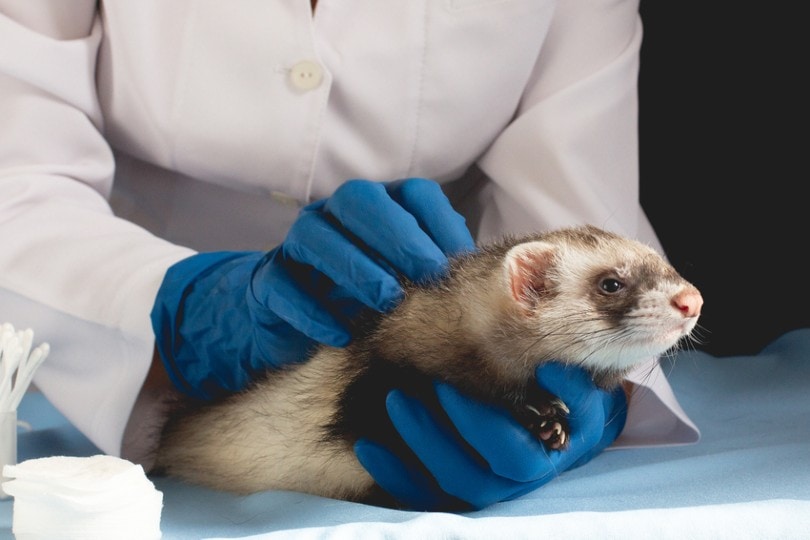
Breeding ferrets isn’t for the faint-hearted. Many things can go wrong—no matter the ferret’s age.
However, you can lower the chance of complications by waiting until the ferret is at least 1 year old to start breeding and before 18 months to avoid any complications. This ensures that the female is fully grown, which helps her carry the litter. While ferrets do hit maturity at around 6 months of age, breeding them this young can result in all sorts of problems. Males get off a bit easier. They aren’t the ones carrying the litter, so they won’t experience negative health effects from being bred too early.
However, there are still many reasons to wait on breeding—even if only so that the male and female are the same size.
Reasons to Delay Breeding in Ferrets
You should wait to breed your ferret until they are 1 year old, even though they may reach sexual maturity at as young as 4–6 months.
1. Health Problems
Ferrets bred at a younger age are more likely to experience pregnancy complications and later health problems. This increased risk is because the female ferret isn’t done developing herself. Directing energy away from her development and towards developing babies can easily result in issues. There may simply not be enough resources to go around.
Plus, the females won’t necessarily be big enough to carry and give birth to the litter. Medical interventions at birth may be more likely when the mother is younger.

2. Genetic Predispositions
Genetic problems don’t always make themselves apparent right away. In many cases, they may not become apparent until the ferret is done growing (or even past then).
You don’t want to breed ferrets with genetic issues, as there is a chance they will pass them on to their babies. You only want to breed the healthiest ferrets.
Therefore, waiting to breed the ferrets until they are older can be helpful. It gives the ferrets time to mature.
3. Size Differences
You preferably want to wait until the female is at least a year old to prevent health issues. The male won’t develop health problems due to mating too early. However, you don’t want the male and female to have much size difference while breeding. The male could become injured if he is much smaller than the female.
Therefore, it often makes sense to wait until the male is at least a year old, too. After that, ferrets don’t grow much, so the exact age doesn’t matter much.
You should also be careful not to breed very small or underweight ferrets, even if they are technically old enough. Size is very important when it comes to breeding ferrets.

4. Socialization
You want your ferret as socialized as possible before breeding them. This helps ensure that the ferret is more comfortable with handling and vet visits. Otherwise, getting your ferret (or her babies) the help she needs can be extra challenging, which is the last thing you want in an emergency. Plus, you’ll want to socialize the babies as early as possible, and you can’t do that if the mother ferret is aggressive.
Many ferrets undergo emotional and behavioral changes while pregnant and after birth. A ferret that’s pretty much socialized may suddenly not be. Therefore, it’s necessary to have your ferret as socialized as possible beforehand.
Therefore, those last 6 months between sexual maturity and breeding can really help ensure your ferret is socialized and comfortable. You’ll often need those extra months to ensure your ferret is up to the task emotionally, even if they check off all the other boxes.
5. Testing
Before breeding, there are several tests you may want to run on your ferret. Some ferret owners get their males tested for fertility, ensuring that they can even get a female pregnant in the first place.
Several genetic tests are available, though which ones you choose depends largely on your area and the ferrets you’re dealing with.
Most of these tests cannot be done until the ferret is older. Therefore, it’s often in the breeder’s best interest to wait until these tests can be performed accurately.
6. Increased Fertility
Sexual maturity is more of a process than a switch-flipping, especially in males. Fertility will increase as the male reaches their prime. Breeding males exactly when they show signs of sexual maturity is less likely to result in pregnancy than waiting. Because breeding is full of potential complications, it often makes more sense to wait until fertility is maximized.
The same can be said for females, too. Fertility tends to increase after sexual maturity. They aren’t suddenly very fertile one day when a switch flips. It’s a process (though they can still get pregnant right away, the chances are just lower).
While you can have baby ferrets as soon as your ferret hits sexual maturity, you’re much more likely to get some if you wait for their fertility to increase.

Frequent Asked Questions
At What Age Can I Start Breeding My Female Ferret?
Female ferrets usually reach sexual maturity at around 6 months to 1 year. However, it is best to wait until they are at least a year old before breeding them. This helps prevent complications due to the mother being too small or underdeveloped.
The female should be fully grown and a healthy weight before breeding. Sometimes, this may mean waiting longer than a year for breeding.
How Can I Tell My Female Ferret Is Ready to Breed?
Even if they’re technically the right age, you’ll need to wait for signs of willingness before introducing the female to the male.
These signs include a swollen vulva, changes in behavior such as increased aggression or restlessness, and increased appetite. However, it’s important to note that breeding should only be done when the ferret is physically mature and healthy, not solely based on these signs.
What Is the Recommended Age for Breeding Male Ferrets?
Breeding male ferrets is a bit less strict, as they aren’t the ones carrying the litter. However, you should wait until the male is about 1 year old for breeding. This will give them enough time to fully mature and develop their reproductive system. Additionally, it’s important to ensure that the male ferret is healthy.
Is It Safe to Breed Ferrets Older Than One Year?
While it’s not recommended to breed ferrets younger than a year old, it is generally safe to breed ferrets older than a year.

Conclusion
It’s best to wait until ferrets are about 1 year old to breed. While ferrets can reach sexual maturity sometime before then, they typically aren’t fully grown until about 1 year. Otherwise, you risk your ferret being unable to carry the litter properly, resulting in health and pregnancy problems.
Males are less likely to develop health problems because they aren’t carrying the litter. However, there are still several reasons to delay their breeding, too. It helps ensure they’re fertile and have undergone all necessary testing. Plus, it’s usually best that the male and female are about the same size.
It’s often best to breed ferrets before 18 months if you plan to breed them. Therefore, the period between 12 and 18 months seems to be the sweet spot.
Featured Image Credit: Couperfield, Shutterstock







